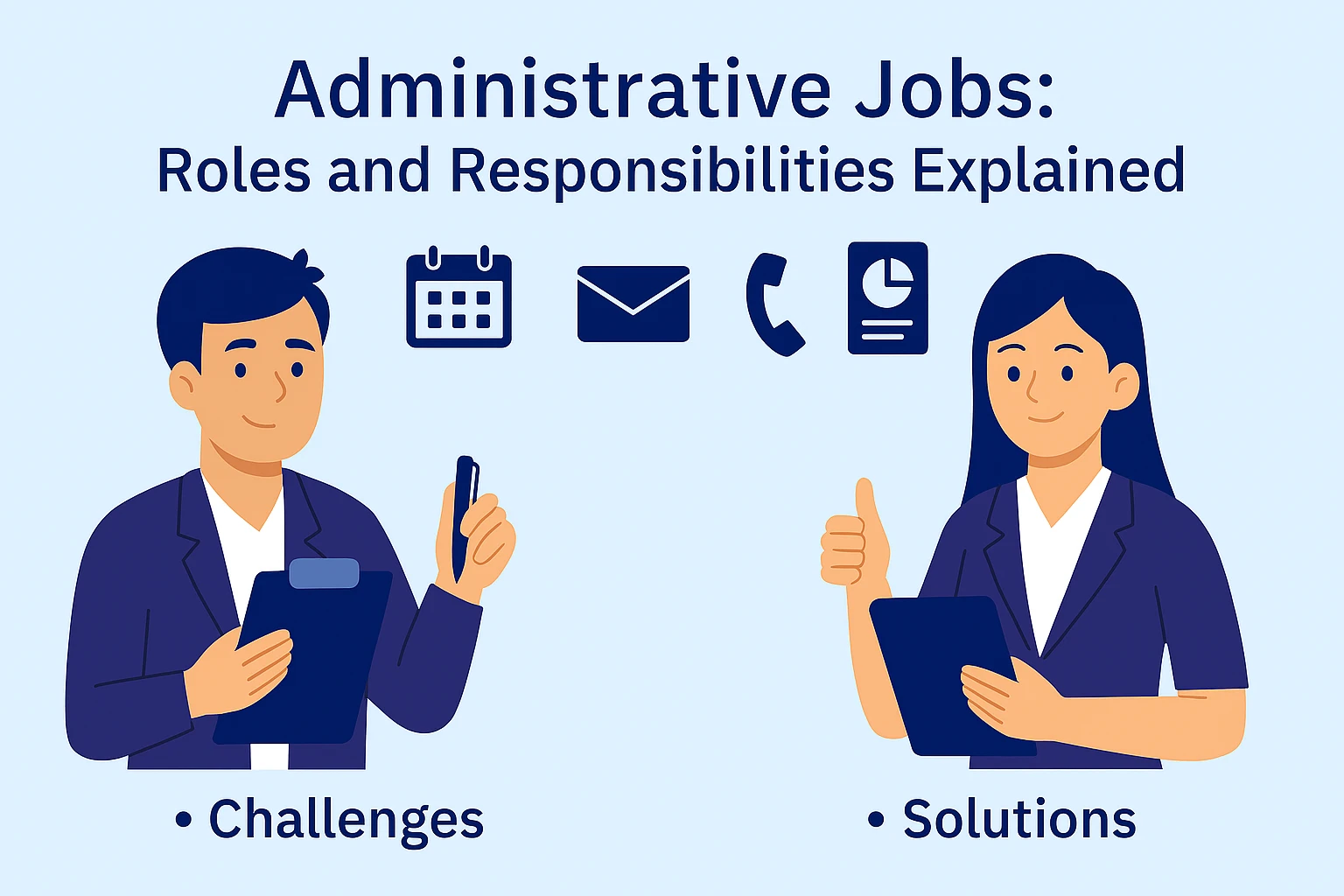In today’s fast-paced, tech-driven world, administrative jobs are the backbone of organizations across industries, from healthcare to corporate offices. These office roles ensure smooth operations, efficient workflows, and seamless communication, often leveraging digital tools to enhance productivity. According to the U.S. Bureau of Labor Statistics, administrative professionals, including secretaries and assistants, hold over 3.6 million jobs in the U.S. alone, with healthcare administration growing rapidly due to AI and digital health advancements. This article explores the diverse roles and responsibilities of administrative jobs, highlighting how office roles contribute to organizational success and support digital well-being in 2025.
From managing schedules to handling sensitive data, Administrative Careers require adaptability and tech-savviness, especially in healthcare where office roles intersect with innovations like electronic health records (EHRs). With search trends for “administrative jobs” and “office roles” reflecting career interest, this guide breaks down key duties, skills, and opportunities, particularly in health-tech contexts, to help you navigate this dynamic field. For insights into advanced career paths, explore our guide on MBA Explained: Key Benefits and Career Opportunities.

Overview of Administrative Jobs
Administrative Careers encompass a wide range of office roles that support organizational operations. These positions ensure businesses, schools, hospitals, and government offices run efficiently by handling tasks like scheduling, communication, and data management. The U.S. Bureau of Labor Statistics projects steady demand for administrative professionals, with a 5% growth in healthcare administrative roles by 2030 due to aging populations and digital health advancements.
Whether in corporate settings or hospitals, office roles are pivotal in coordinating teams, managing resources, and maintaining workflows, making them indispensable in today’s digital age.
Types of Administrative Jobs
Administrative Positions vary by industry and scope. Here are common office roles:
Administrative Assistant
Administrative assistants handle scheduling, correspondence, and office organization. They often use tools like Microsoft Office or Google Workspace to manage calendars and emails.
Executive Assistant
Supporting C-suite executives, these professionals manage high-level schedules, travel, and confidential communications, requiring strong discretion and multitasking skills.
Office Manager
Office managers oversee operations, from budgeting to staff coordination, ensuring a productive workplace. They often implement digital tools to streamline processes.
Medical Secretary
In healthcare, medical secretaries manage patient records, billing, and appointments, often using EHR systems, aligning with health-tech trends. For more on medical education, see MBBS Admissions 2025-26: Eligibility, Age & Exam Guide.
Data Entry Clerk
Focused on inputting and organizing data, these roles require accuracy and familiarity with database software, critical in data-driven industries like healthcare.
Key Responsibilities in Office Roles
The responsibilities of administrative jobs depend on the role but share common themes. Here’s a breakdown:
- Scheduling and Coordination: Managing calendars, booking meetings, and arranging travel.
- Communication: Handling emails, phone calls, and interdepartmental correspondence.
- Data Management: Organizing files, updating databases, and ensuring data accuracy.
- Customer Service: Greeting clients, answering queries, and resolving issues.
- Financial Tasks: Processing invoices, managing budgets, and tracking expenses.
In healthcare, office roles may include additional duties like coding medical records or ensuring HIPAA compliance, tying to digital well-being by safeguarding patient data.
Administrative Positions in Healthcare
Healthcare Administrative Positions are among the fastest-growing office roles, driven by AI and digital health innovations. Roles like medical secretaries, health information technicians, and hospital administrators manage patient scheduling, billing, and EHRs. A 2025 report from HIMSS (Healthcare Information and Management Systems Society) notes that AI tools streamline 30% of administrative tasks in hospitals, enhancing efficiency.
These roles support digital well-being by ensuring accurate data handling and patient privacy, critical in an era of health-tech advancements. For more on AI’s role, see our article on AI in Healthcare 2026: Revolutionizing Patient Care.
Essential Skills for Administrative Jobs
Success in administrative jobs requires a blend of soft and technical skills:
Organizational Skills
Managing multiple tasks and deadlines is core to office roles. Tools like Trello or Asana help prioritize workloads.
Communication Skills
Clear verbal and written communication ensures effective coordination across teams.
Tech Proficiency
Familiarity with software like EHRs, CRM systems, and Microsoft Office is essential, especially in tech-driven office roles.
Problem-Solving
Administrative professionals resolve scheduling conflicts or client issues with quick thinking.
Attention to Detail
Accuracy in data entry and record-keeping prevents costly errors, particularly in healthcare settings.
Impact of Technology on Office Roles
Technology is reshaping administrative jobs. AI tools automate repetitive tasks like scheduling or data entry, freeing professionals for strategic work. In healthcare, office roles leverage AI-driven EHR systems to streamline patient management, reducing errors by 25%, per a 2025 JAMA study. Cloud-based platforms like Google Workspace enhance collaboration, while virtual assistants handle routine inquiries, supporting digital well-being by reducing workplace stress.
However, tech adoption requires upskilling. Administrative professionals must learn to navigate AI tools and data analytics to stay competitive. To explore top institutions for tech-focused education, check out Guide to JEE Main & Advanced: Top B.Tech Colleges in India.
Challenges in Administrative Jobs
Despite their importance, administrative jobs face challenges:
- High Workload: Juggling multiple tasks can lead to burnout, especially in understaffed offices.
- Data Privacy: Handling sensitive data, like patient records, requires compliance with laws like HIPAA, tying to digital well-being.
- Tech Adaptation: Rapid tech changes demand continuous learning.
- Undervaluation: Office roles are sometimes seen as low-skill, despite their complexity.
Addressing these challenges through training and recognition enhances job satisfaction and performance.
Future of Administrative Jobs in 2025
By 2025, administrative jobs will evolve with technology and workplace trends. Automation will handle routine tasks, allowing office roles to focus on strategic planning and employee wellness. In healthcare, AI-driven tools will expand roles like health information management, with a projected 17% job growth by 2030, per BLS. Hybrid work models will also redefine office roles, emphasizing remote coordination and digital literacy.
The future promises opportunities for those who embrace tech and adaptability, ensuring administrative jobs remain vital to organizational success and digital well-being.
FAQs:
What are administrative jobs?
Administrative jobs are office roles that support organizational operations, including scheduling, communication, and data management, across industries like healthcare and corporate settings.
What are the main responsibilities of office roles?
Responsibilities in office roles include scheduling, managing communications, data entry, customer service, and financial tasks, ensuring smooth operations.
How do administrative jobs in healthcare differ?
Healthcare administrative jobs involve managing patient records, billing, and EHRs, often using AI tools, and prioritize patient privacy to support digital well-being.
What skills are needed for Administrative Positions?
Administrative jobs require organizational, communication, and tech skills, plus problem-solving and attention to detail, especially in tech-driven office roles.
How is technology shaping the future of office roles?
AI and automation streamline tasks in office roles, like scheduling and data management, while upskilling in digital tools enhances digital well-being and efficiency.


